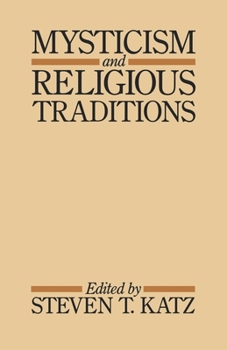Mysticism and Religious Traditions
Select Format
Select Condition 
Book Overview
Deals with the relationship between mystics and the religious communities out of which they emerge and of which they are a part.
Format:Paperback
Language:English
ISBN:0195033140
ISBN13:9780195033144
Release Date:November 1983
Publisher:Oxford University Press
Length:288 Pages
Weight:0.58 lbs.
Dimensions:0.7" x 5.5" x 8.5"
Customer Reviews
2 ratings
Mysticism and Religous Traditions
Published by Thriftbooks.com User , 16 years ago
This book and Katz's prior edited collection of essays on Mysticism are both brilliant. Steven Katz, and the others who offer their essays in this collection. realize that: `beliefs shape experience, just as experience shapes belief.' Additionally: `There are NO pure (i.e. unmediated) experiences. ...in order to understand mysticism it is not just a question of studying the reports of the mystic after the experiential event but of acknowledging that the experience itself as well as the form in which it is reported is shaped by concepts which the mystics brings to, and which shape, his experience.' Our experience of life, including the mystics experience of communion is shaped by our specific cultural maps. Each mystical tradition varies as each religious community varies. Comparing brain imaging and believe that this is an example of cultural experience is to mistake the image of the brain when we make love with the actual experience of making love. The two are not the same. Similarities in brain activity only demonstrate that the participants are both physically human and that is all. To understand an experience you have to go beyond merely comparing biological workings. All mystics are humans and so to begin with they all have an experience that is at root similar - a human contacting the Infinite Divine. But once that experience ceases and the mystic begins to process and understand what had occurred this is when the differences between individuals and the culture they come from take affect. The experience may be similar but the process of taking that from the non-verbal event to a verbal understanding is when it all becomes transformed. That transformation is shaped by the mystics cultural background. The book and Katz's essays are brilliant insights into how the mystics prior world view shapes their mystical experience of the Infinite Divine.
Excellent book despite editor's worn-out prejudice
Published by Thriftbooks.com User , 22 years ago
Anyone who has read Dr. Katz is familiar with his worn-out denial of the existence of any cross-cultural phenomenon that one might call mysticism. Now that science has given us brain-imaging his radically anti-comparative stance is no longer plausible. Of course those of us who practice were aware of this many years ago. My opinion of the editor aside, the book has at least two superb articles. Ninian Smart's section is a brilliant examination of "consciousness-purification," the core of mystical practice. John Carman presents a classic paradox found in bhakti that also runs through a number of mystical traditions: "a fluid transition moving back and forth easily between dualistic theism and monistic mysticism." Hans Penner's topic, "The Mystical Illusion," gives you a good idea how foolish an author can be who does not actually practice the art.For a definitive refutation of Katz's constructionist theory, see "The Problem of Pure Consciousness" by Robert K. C. Forman. This book is also an excellent read. Raymond Sigrist apophaticmysticism.com






